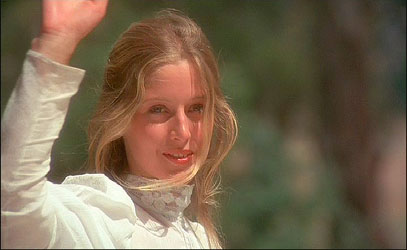I've given myself several days to process
Australia, but I'm still a bit befuddled. I don't know what specific facet or aspect of the film to write about with focused concentration. It has been interesting to read my classmates' reviews and
Australia-related blog posts before and after watching the film. I think I would be best suited at the moment to just share my general impressions of the cinematic extravaganza.
First, I'll try to focus on the positives that I took away from the film. As has been noted in another blog post, the film is visually captivating. I can't deny that the color schemes and special effects are awe-inspiring. Knowing that Baz Luhrman is responsible for
Moulin Rouge, I was worried that
Australia would be too over-stylized to enjoy on any level. I was pleasantly surprised (although I had lowered my expectations after reading some of the early feedback posted by my classmates). Now that I think about it, I think that having a forewarning of sorts helped me to enjoy the film more than I otherwise would have. I was expecting a campy, over-done, overly ambitious film... and I got exactly what I was expecting, more or less. The only other positives that I can recall are watching Wolverine return to his Australian roots, getting to see David Gulpilil's familiar (although drastically aged) visage, and being introduced to the young actor that played Nullah.
I don't know whether I'm in the minority or not, but I feel like I was not exposed to a lot of advertisements for
Australia before its release or before I went to see it. Even now, after having seen it, I still don't feel like I'm exposed to a lot of advertisements for the film. My girlfriend has, apparently, and she mentioned something interesting after
Australia finally ended. The young actor who plays Nullah recieves virtually no attention in the majority of the advertisements that she has seen. I find it curious that the young actor recieves such little attention, especially considering that he puts forth (what I thought was) the best performance in the film... and the film, as the text that bookends it suggests, is narratively strung together by the plight of the stolen generation.
In terms of the negatives that I took away from the film...
While I can identify all of the Australian trademarks in
Australia (except for mateship), and the Australian landscape dominated so many hours of screen time, I still don't feel like the film was that Australian in terms of tone or genre. The first half felt like an American Western, and the second half felt like
Pearl Habor only set in Darwin. I think that the running time of
Australia hurts it or will hurt its success in America. I know I have ADD as an audience member, and I found that I felt lost or confused at multiple points throughout
Australia because there was so much to keep tabs on. Luhrman needed to trim the fat a bit more and decide which story he wanted to tell and which movie he wanted to make. Other things that didn't sit well with me were instances of contrived timing (e.g: Drover arriving just as Kidman's character wonders aloud where she will find a driver, the Japanese arriving at Mission Island at the same time as Drover and the rescue crew, etc. etc.) and music that counteracted the mood (e.g: all of the uplifting music during the various and many deaths... The music that plays during the drunk bookkeeper's death scene feels quite uplifting to me).
All in all, it wasn't a movie I would have ever seen had I not been assigned to see it. It's also not a movie I would ever watch again, or at least not in the near future. However, having had a forewarning of sorts from my classmates and consequently altering my expectations, I was able to enjoy
Australia more than it seems that some others have. I'll update this blog post with a picture and links to make it "legitimate" in the next couple of days.






